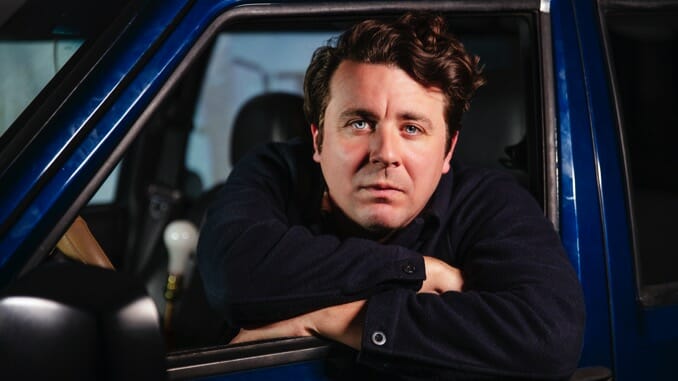Joe Pug on Revisiting Nation of Heat with an Older, Wiser Voice
What the folk singer/songwriter learned updating his spartan first EP with full-band treatments
Photo by Ryan Nolan
In the beginning, all Joe Pug had was an acoustic guitar and a handful of songs. It reads like biblical history or a folk tale the singer-songwriter might’ve bellowed on his debut EP, Nation of Heat, but he actually lived it.
In 2007, Pug, then a 22-year-old recent college dropout, had little else to his name when he recorded the EP’s seven songs in Chicago. He sneaked in studio time when other artists canceled and laid down plaintive American ruminations in his smoky voice. Today, he calls the sparse collection “one step away” from a demo tape. “In fact, if I was going to do demos at that time, I don’t know how they would’ve been done any differently,” Pug says over the phone from his home in Maryland.
As such, he has since lived with a nagging thought: What if he recorded a full-band version of the EP, one he could count as definitive? Now equipped with a home studio where he doesn’t have to rely on no-shows—in an idyllic mid-Atlantic spot where birds chirp in the background during our call—Pug spent the better part of a year updating those hymns to make a “revisited” version of Nation of Heat, out this week. This time, though, he kept his trusty Guild in its case. “There’s no acoustic guitar on this album at all, very intentionally,” he says. “I didn’t want this record to be the original Nation of Heat with a rhythm section quietly mixed in the background. This needed to be an entirely new thing.”
That’s a powerful stance to take, given Nation of Heat’s reputation. After he self-released it in the late 2000s, the EP slingshotted Pug’s career. He opened for Americana legend Steve Earle, who became a mentor, and eventually released five full-length albums, sounding older and wiser on each. The new Nation of Heat still plays like a travelogue through a cracking empire, though its narrator brims with youthful optimism. Pug balances every line about shifty street lamps claiming to be stars with first-person bravado: “I’d rather be nobody’s man than somebody’s child”; “I am Dakota thunder raging”; “I’ve come to test the timbre of my heart.”
Like the weary pilgrims trudging wintry roads he sings about, Nation of Heat | Revisited breaks new ground even as it retreads an old path. Defiant folk staple “I Do My Father’s Drugs” retains its harmonica and little else, adding a technicolor synth intro played by Derry deBorja of Jason Isbell’s 400 Unit band. Opener “Hymn #101,” meanwhile, remains his signature song (with nearly 10 million streams on Spotify alone). That’s why it was the logical place where Pug began the work. Unlike Taylor Swift’s ambitious plan to re-record her biggest pop albums in order to regain control of her catalog, Pug’s idea was simpler. “A lot of it has to do with being an independent artist,” he says. “I own all my masters at this point. I own all of my publishing, so I’m really in a position where I can do whatever I want with it.”
What he wanted was a patchwork, and modern technological ease made that possible. Pug enlisted more than a dozen musicians to record parts remotely and simply plugged in what worked best from the comfort of his home studio. He found inspiration in how different groups in the 1960s recorded their respective takes on the same popular tunes. “You don’t have to be precious with songs,” he says.
To that end, Pug didn’t overthink the updated versions. He left the work to his collaborators and focused his own energy on how everything actually sounded, rather than how it felt, or even the particulars of how it came together. “I used to get hung up a lot on process when I was younger,” he says. “I’d be like, ‘Well, the only way you can get a good vibe is to have a bunch of people in a room.’ I’ve just really found that process matters so little and the only thing that matters is what’s coming out of speaker left and speaker right.”
-

-

-

-

-

-

-

-

-

-

-

-

-

-

-

-

-

-

-

-

-

-

-

-

-

-

-

-

-

-

-

-

-

-

-

-

-

-

-

-








































